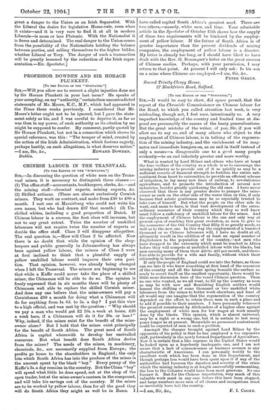SIR,—It would be easy to show, did space permit, that
the report of the Chronicle Commissioner on Chinese labour for the Rand, to which you called attention last week, is very misleading, though not, I feel sure, intentionally so. A very imperfect knowledge of the country and limited time at dis- posal are presumably the causes of the hasty generalisations. But the great mistake of the writer, of you, Sir, if you will allow me to say so, and of many others who object to the employment of Chinese labour, is in talking of the regenera- tion of the mining industry, and the enrichment of its mag- nates and immediate bangers-on, as an end in itself instead of only a means—a disagreeable one to a good many people evidently—to an end infinitely greater and more worthy.
What is wanted by Lord Milner and others who have at heart the true welfare of the country as a whole is so to encourage the mining industry as to provide out of it as quickly as may be a sufficient reserve of financial strength to fertilise the entire sub- continent from heart to extremities, to provide an efficient scheme of irrigation, to lay many now lines of railway, to revolutionise agriculture, and to promote the introduction of several new industries, besides greatly quickening the old ones. I have never observed that there is any greater desire to pamper the mine- owner as such on the other side of the water than on this, if only because that astute gentleman may be so especially trusted to take care of himself. But what the people on the other side do want, and mean to have, is that vast development of the extra- ordinary resources of their country which they so well know must follow a sufficiency of unskilled labour for the mines. And the employment of Chinese labour is the one and only way at present open of reaching this great evolution, so soon to give to the commerce of the Old Country that fillip it so greatly needs, as well as to the new one. In this way the employment of a hundred thousand or so Chinese labourers will, I have no doubt at all, ultimately result in the addition of at least an equal number of Englishmen to the population of the country,—not men who have dropped to the extremity which must be reached in Africa before they will compete at unskilled labour with the blacks, but men earning many of them their £20 to £25 per month, and there- fore able to provide for a wife and family, without which their citizenship is incomplete.
If only the people of England could see into the future, as those can see into it who know something at first hand of the resources of the country and all the latent spring beneath the surface so ready to assert itself on the smallest opportunity, there would be little more discussion here of the vexed Chinese question. Then no one who wanted, as we all want, to fill up the country as soon as may be with new and flourishing English settlers would lament the shifting of some thousand or two unskilled white labourers from the mines to better work elsewhere, and least of all would any one imagine that the regeneration of the country depended on the effort to retain these men in such a place and to add if possible to their numbers. I have personally witnessed the greatest resentment by Afrikanders of a higher class against the employment of white men for low wages at work usually done by the blacks. This opinion, which is almost universal, may be a right or a wrong one, but it is certain to last many years longer as at present. Meanwhile no permanent contentment could be expected of men in such a position.
Amongst the charges brought against Lord Milner by the opponents of his policy is that he has employed a too expensive staff, particularly in the newly formed Department of Agriculture. Now it is certain that a like expense in the United States would be looked upon as a hopelessly inadequate one, and I am not aware that a lack of common-sense or business acumen is any characteristic of Americans. I can personally testify to the excellent work which has been done in this Department, and though perhaps less would have been spent upon it if any of the authorities had foreseen the duration and severity of the crisis which the mining industry is at length successfully surmounting, the loss to the Colonies would have been most grievous. No one foresaw it. But for the Chinese importation, very much of this valuable work must in any case before this have been stopped, and large numbers more men of all classes and occupations must as inevitably have left the country.
—I am, Sir, &c., F. I. COOKE.










































 Previous page
Previous page